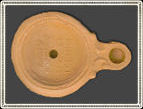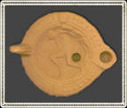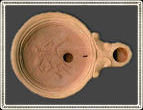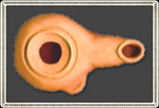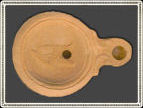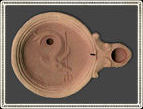Oar
Poles used to propels boats and ships.
Etymology: Middle English oor, from Old English Ar; akin to Old Norse Ar oar; Date: before 12th century;
"A long pole with a broad blade at one end used for propelling or steering a boat." — Merriam-Webster Dictionary ©2004-2006
"The size and weight of the oars used will doubtless seem surprising, but, in practice, they are effective and beautiful levers." — Raiders of Gor, pages 193-194.
Oar-Maker
Carpenter skilled at making oars.
The next item on the agenda dealt with the demand of the pulley-makers to receive the same wage per Ahn as the oar-makers. I voted for this measure, but it did not pass. A Captain next to me snorted, "Give the pulley-makers the wage of oar-makers, and sawyers will want the wages of carpenters, and carpenters of shipwrights!" — Raiders of Gor, page 134.
Oar-Master
One on a ship that watches oversees the galley slaves at the oars of the great ships; works in conjunction generally with the keleustes, however in the absence of such, must call time verbally to the oarsmen. See also: "Keleustes."
"I heard the oar-master call his time again and again, not hurrying his men, each time more faintly than the last." — Raiders of Gor, page 62.
Oar Shearing
Naval strategy commonly used; ships are equipped with shearing blades, which can devastate an enemy ship. See also: "Shearing Blades."
"One of the most common of naval strategies, other than ramming, is oar shearing…." — Raiders of Gor, pages 136-137.
Obeisance
An action or movement which shows deference to another.
Eta then faced my captor. "La Kajira," she said, submissively inclining her head to himů Then Eta turned to me, laughing, pointing to my mouth. I did not understand. She pointed to her own mouth, again faced my captor, and again said, "La Kajira," again performing an obeisance before him. — Slave Girl of Gor, page 64.
Observation Panel
Panel through which to view into another room, generally unseen.
"I was much surprised when I saw, about four feet inside this door, a second door. In this second door there was an observation panel, which slid back. A woman looked through the panel, saw Ho-Tu and nodded." — Assassin of Gor, pages 113-114.
"I began moving down the Nine Corridor. Soon, in the flickering light of the torch, I could read the Forty on the tiny metal plate over one of the cells. I slid back the observation panel. It, like the others, was about six inches in width and about an inch high. A man could do little more than thrust his fingers through." — Assassin of Gor, page 274.
Oblique Advance
Developed by Dietrich of Tarnburgh, this formation makes it possible for armies to choose to attack limited portions of the enemy, therefore engaging a much larger army and chipping away at it piece by piece.
"He was also the initiator of the oblique advance in Gorean field warfare, whereby large numbers of men may be concentrated at crucial points while the balance of the enemy remains unengaged." — Mercenaries of Gor, page 32.
Odds Merchants
The bookies of Gor; also referred to as "Track Merchants."
"The crowd was now engaged in various pursuits, no fixed center now holding their attention. Several were going about seeking the odds Merchants, several of whom wandered in the stands, but others of whom kept their tables at the foot of the stands, on the sand itself, almost under the nets beneath the rings." — Assassin of Gor, page 141.
"Many of them, too, were much involved in the race, for concealed in their trays or about their persons were doubtless the glazed clay tablets, purchased from the track merchants, redeemable at odds should their favorites finish in one of the four privileged positions." — Assassin of Gor, page 139.
"Further, at this time, the odds merchants of the Stadium of Tarns, made it known that the administrator was heavily in debt, and they, not to be left out, demanded their dues." — Assassin of Gor, page 234.
"… all the way to the betting table. I was now some twenty men from the table… In moments I was two men from the table. Then there was only one man before me. 'Next,' called the odds merchant… I grinned, and left the vicinity of the tables. I would have preferred to have had better odds, but I had managed to place my bet before they had more than doubled against poor Centius of Cos. I stood now to win a hundred golden tarns. I was in a good mood." — Beasts of Gor, pages 51-53.
Oil Clock
A clock which uses oil to tell time.
"The average Gorean has a variety of simple devices at his disposal for making the passage of time. Typical among them are marked, or calibrated, candles, sun dials, sand glasses, clepsydras and oil clocks." — Magicians of Gor, page 358.
Oil Lamp
Lamps fueled by oil, usually of tharlarion oil; these lamps can be shallow bowls which rest atop shelves, or hanging lamps. See also: "Tharlarion Oil Lamp."
I saw the spark of Kazrak's fire-maker, and I felt the flush of friendship as I saw his features briefly outlined in the glow.
He lit the small hanging tent lamp, a wick set in a copper bowl of tharlarion oil, and in its flickering light turned to the sleeping mat. — Tarnsman of Gor, page 167.
"On each side of the door, in a small niche sheltered from the drizzle, there sputtered the yellow flame of a small tharlarion oil lamp." — Outlaw of Gor, page 76.
"… the oil in the hanging tharlarion lamps needed to be renewed by the sweating, joyful proprietor of the Kal-da shop." — Outlaw of Gor, page 80.
"The halls were lit occasionally by tharlarion oil lamps set in iron fixtures mounted in the walls." — Outlaw of Gor, page 89.
"A small, foul tharlarion lamp burned at each end." — Outlaw of Gor, page 147.
"From where she knelt she could see the low-hanging tharlarion oil lamps of the main portion of the Paga tavern, the men, the girls in silk who, in a moment, belled, would move among them, replenishing the paga." — Assassin of Gor, page 8.
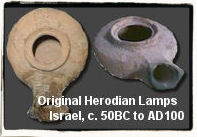
"She struck together, over a copper bowl, a bit of steel and flint, the sparks falling into some dried petals of the rence. A small flame was kindled into which she thrust a bit of rence stem, like a match. The bit of stem took the fire and with it she lit a tiny lamp, also sitting in a shallow copper bowl, which burned tharlarion oil. She set the lamp to one side." — Raiders of Gor, page 33.
"Light the lamp," she said to me. I did so, fumbling in the darkness, striking together the flint and steel, sparks falling into the small bowl of dried petals of the rences. In this tiny flame I thrust a bit of rence stem, from a bundle of such, and, with it, lit the tiny tharlarion-oil lamp set in its copper bowl. I put the bit of rence stem back, as I had seen Telima do, in the small bowl of petals, where, with the flaming petals, it was soon extinguished. The tharlarion-oil lamp, now lit, flickering, illuminated the interior of the hut with a yellowish light. — Raiders of Gor, page 48.
|
|
|
c. mid AD 1-2 — The Latin inscription on this lamp's discus is copied from a Roman New Year's lamp now in the British Museum. The translation is about the equivalent of our own "Happy New Year". Giving lamps to friends and family was a Roman tradition at the New Year. |
c. AD 200 — A Roman styled lamp with a nude Greek woman, possibly a hetarai, gazing upon her reflection in a hand held mirror. The shoulder is ornamented with a series of raised dots. |
c. a mid AD 1-2 — Romans loved the games as much as Americans love football and Roman lamps often depicted gladiatorial contests. This scene depicts two Samnites; gladiators fought and dressed in specific styles that were reflected in their armor, weapons, and methods of combat. |
|
|
|
c. 300 BC — The rounded body of the Hellenistic Greek lamp has a lug on the side and an elongated spout. These lamps were common in the Greek colonies of Italy as well as the rest of the Greek world. |
c. mid AD 1 — This lamp features a standing gladiator dressed in the manner of the Thraex, or Thracian gladiator. |
c. a mid AD 1-2 — This lamp has a dolphin carrying a trident. Many examples of this motif are known from Roman times. |
Olakota
The term in the dialect of the Kaiila tribe of the red savages meaning "peace."
He then added, in Kaiila, for good measure, substantially the same message. "Hou, Kola. Hou, Mitakola. Olakota. Wolakota." "Greetings, Friend. Greetings, my friend. Peace. Peace. Friendship." — Savages of Gor, page 257.
Old Gorean
A language cultivated by the Initiates; not used by the common public.
"… Old Gorean, a language cultivated by the Initiates but not spoken generally on the planet …" — Tarnsman of Gor, page 40.
Olives
Tree which bears an edible fruit of the same name, used often as garnishes.
"Clitus, too, had brought two bottles of Ka-la-na wine, a string of eels, cheese of the verr and a sack of red olives from the groves of Tyros." — Raiders of Gor , page 114.
Olni River
Major tributary of the Vosk.
Omen Taking
A time of gathering of the Wagon Peoples, where the haruspexes read the omens.
Omen Valley
The place where Omen-Taking is done.
Omen Year
A gathering of the wagon peoples.
"The Wagon Peoples war among themselves, but once in every two hands of years, there is a time of gathering of the peoples, and this, I had learned, was that time. In the thinking of the Wagon Peoples it is called the Omen Year, though the Omen Year is actually a season, rather than a year…" — Nomads of Gor, page 11.
Omnion
One of the 28 letters of the Gorean alphabet.
"Over forty percent of the language consists of the first five letters I mentioned, Eta, Tau, Al-Ka, Omnion and Nu… Further, over sixty percent of the language consists of those five letters plus Ar, Ina, Shu and Homan." — Slave Girl of Gor, page 384.
Onager (pl. Onagri)
One-Strap
One of the six (6) leather reins used in guiding a tarn. Tarl Cabot was able to teach his tarn to respond to verbal strap commands.
"To rise into flight, or gain altitude, one draws on the one-strap…" — Tarnsman of Gor, page 55.
"One-strap!" I laughed, delighted, bursting with pleasure, and the plumed giant, that titan of Gor, began to climb steeply. — Outlaw of Gor, page 130.
One-Way Mirror
Developed by the Builders, on one side, a person can see through as if a window, on the other side, it appears only to be a mirror; commonly found in slave house.
Ho-Tu turned into a side corridor and we found ourselves, to my surprise, looking through a huge rectangle of glass, some twelve feet high and perhaps fifteen feet wide; it was one of a dozen such panels I could see in the corridor. Beyond the glass I looked into what seemed to be a Pleasure Garden, lit by energy bulbs radiant in its lofty ceiling. There were various hues of grass, some secluded pools, some small trees, a number of fountains and curving walks. I heard the music of a lute from somewhere. Then I stepped back for I noted, coming along one of the curving walks, two lovely girls, clad in white, their hair bound back with white silk; they were quite young; perhaps less than eighteen.
"Do not fear," said Ho-Tu. "They cannot see you." I studied the glass that separated us. The two girls strolled near the glass and one of them, lifting her hands behind her head, studied her reflection gravely in the mirror, retying the band of silk which confined her hair. "On their side of the glass," said Ho-Tu, "it seems a mirror." I looked suitably impressed, though of course, from Earth, I was familiar with the principles of such things. "It is an invention of the Builders," said Ho-Tu. "It is common in slave houses, where one may wish to observe without being observed."
"Can they hear us?" I whispered.
"No," said Ho-Tu. — Assassin of Gor, pages 114-115."One entire side of the room, the left, facing the front, was a mirror. This mirror was, as might be expected, a one-way mirror. Various members of the House might observe the training without being noted from behind this glass." — Assassin of Gor, page 193.
On-Guard Position
Fighting stance of the Warrior.
"It passed through his throat, returning me to the on-guard position." — Raiders of Gor, page 55.
Onion
Presumably the same as Earth onions.
"I have peas and turnips, garlic and onions in my hut." — Outlaw of Gor, page 29.
Opal
Gemstone; all opals on Gor very rare and valuable. The common opal is a milky white color; the flame opal is reddish and blue (perhaps what is known on earth as the "black opal" or "fire opal").
"Before Suleiman, now, there lay five stones, three sereem diamonds, red, sparkling, white flecked, and two opals, one a common sort, milky in color, and the other an unusual flame opal, reddish and blue. Opals are not particularly valuable stones on Earth, but they are much rarer on Gor; these were excellent specimens, cut and polished into luminescent ovoids, still, of course, they did not have the value of the diamonds." — Tribesmen of Gor, page 92.
Or
Ten. This term refers to the smallest division of warriors of the Wagon Peoples. Similar to that of a squad in the U.S. Army.
"… each warrior of the wagon peoples, and that means each able-bodied man, is a member of an Or, or a Ten…" — Nomads of Gor, page 175.
"… the four Tuchuk guards smote their lances three times on their leather shields. The lance strikes the shield once for the commander of a Ten…" — Nomads of Gor, page 250.
Orlu
Hundred. This term refers to the division of warriors of the Wagon Peoples made up of ten Tens. Similar to that of a unit in the U.S. Army.
"… each Ten is a member of an Orlu, or Hundred." — Nomads of Gor, page 175.
"… the four Tuchuk guards smote their lances three times on their leather shields. The lance strikes the shield… twice for the commander of a Hundred …" — Nomads of Gor, page 250.
Oralu
Thousand. This term refers to the largest division of warriors of the Wagon Peoples made up of ten Hundreds. Similar to that of a company in the U.S. Army.
"… each Orlu is a member of an Oralu, a Thousand." — Nomads of Gor, page 175.
"… the four Tuchuk guards smote their lances three times on their leather shields. The lance strikes the shield… three times for the commander of a Thousand." — Nomads of Gor, page 250.
"… the next level beneath a Ubar among the Wagon Peoples is that of the Commander of a Thousand." — Nomads of Gor, page 251.
Ost
Poisonous snake of Gor; there are several varieties, such as the "Banded Ost" and the "Ushindi Ost." The orange ost is also referred to as the "common ost" as it is most commonly found on Gor.
"Also in the ground zone are varieties of snake, such as the ost and hith, and numerous species of insects." — Explorers of Gor, page 311.
"The ost is usually an orange snake, but these were Ushindi osts, which are red with black stripes. Anatomically, and with respect to toxin, I am told they are almost identical to the common ost." — Explorers of Gor, page 239.
Ostrakon (pl. Ostraka)
Tickets to events; sometimes used as betting markers.
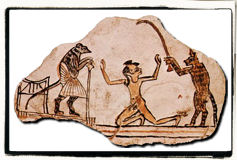 Depicted: Limestone ostracon with a drawing of a cat bringing a boy before a mouse magistrate.
Depicted: Limestone ostracon with a drawing of a cat bringing a boy before a mouse magistrate.
plural ostraca; Etymology: Greek ostrakon potsherd, shell; Date: 1883.
"A fragment (as of pottery) containing an inscription; usually used in plural." — Merriam-Webster Dictionary ©2004-2006Potshard or limestone flake used in antiquity, especially by the ancient Egyptians, Greeks, and Hebrews, as a surface for drawings or sketches, or as an alternative to papyrus for writing as well as for calculating accounts. Of considerable artistic merit, the drawings on ostraca, which are usually coloured, depict scenes from nature and everyday life or scenes in which animals seem to parody human actions (it has been conjectured that the latter illustrated popular fables). — Encyclopaedia Britannica ©2004-2006
"My admission to the races," said another man, a Miller, has been paid a dozen times by the House of Cernus." He referred to a practice of handing out passes, dated ostraka bearing the print of the House of Cernus, outside the gate of the Slayer's house, which were dispensed on a first-come-first-served basis, a thousand a day, each day of the races. Some men spent the night at the walls of the house of Cernus, that they might obtain their ostrakon at dawn. — Assassin of Gor, page 232.
[The] Others
The term that the Priest-Kings used in refernce to the Kur.
"Yes," said Misk." We are at war."
"But it has been so for twenty thousand years," said Misk.
"And in that time you have not managed to bring the war to a successful conclusion?" I asked.
"Priest-Kings," said Misk, "unlike humans are not an aggressive organism. It is enough for us to have the security of our own territory. Moreover, those whom you call the Others no longer have their own world. It died with their sun. They live in a set of Master Ships, each almost an artificial planet in itself. As long as these ships remain outside the fifth ring, that of the planet Earthmen call Jupiter, the Goreans Hersius, after a legendary hero of Ar, we do not fight."
"Would it not be safer if these Others were driven from the system?" I asked.
"We have driven them from the system eleven times," said Misk, "but each time they return." — Assassin of Gor, page 65.
"Their ships have sensing devices perhaps the match of our own; they scatter; they have weapons, primitive perhaps, but yet effective at ranges of a hundred thousand pasangs… For some thousands of years they have, except for continual probes, usually tests to prove the sex of their Dominants, remained beyond the fifth ring. Now, it seems they become more bold."
"The Others," I said, "surely could conquer Earth."
"We have not permitted it," said Misk.
I nodded." I suspected as much," I said.
"It is within the fifth ring," pointed out Misk.
"Further," said Misk, "the Others are themselves a not uninteresting species, and we have permitted certain of them, prisoners taken from disabled probe ships, to live on this world, much as we have humans… They do not live in the same areas, on the whole, that humans do," said Misk." Moreover, we insist that they respect the weapon condition for their permitted survival."
"You limit their technology levels just as you do humans?" I asked.
"Certainly," said Misk. — Assassin of Gor, page 66.
Outboard Oar
The outboard oar is generally the shortest oar.
"The Dorna used oars of varying lengths; her oars, like those of many tarn ships, varied by about one and one-half foot Gorean, oar to oar; the most inboard oar being the longest; the outboard oar being the shortest." — Raiders of Gor, pages 193-194.
Outrider
Scout of the Wagon Peoples.
"1a (1): an attendant on horseback who rides ahead of or next to a carriage; (2): a mounted attendant who escorts race horses to the starting post; b: one who clears the way for a vehicle or person; c: a member of an advance guard or detachment; d: something that precedes or announces the approach of what is to come;
2 dialect: traveling salesman;
3a : a cowboy who rides an inspection about the range; b: Scout." — Merriam-Webster Dictionary ©2004-2006
"The hair on the back of my neck seemed to leap up and I felt the hair on my forearms stiffen. The earth itself was shaking from the hoofs of the bosk herds of the Wagon Peoples. They were approaching. Their outriders would soon be in sight." — Nomads of Gor, page 5.
Outlaw
This refers to any man who refuse to practice his livelihood or attempt to alter his [Caste] status without consent of the Council of High Castes.
"A man who refused to practice his livelihood or strove to alter status without the consent of the Council of High Castes was, by definition, an outlaw and subject to impalement." — Tarnsman of Gor, page 46.
"You wear no insignia on your shield," he said. "You are outlaw." — Nomads of Gor, page 18.
Owopte
The red savages term meaning the place from which a turnip is dug. There is no simple translation for this term.
"There is no simple translation for 'Owopte' but, literally, it means the place from which a turnip is dug. He had used to go out with his mother to dig turnips when he had been a little boy. That was a pet name which she had given him. He had been fond of the vegetable. He had not lived long enough to choose a suitable adult name for himself." — Blood Brothers of Gor, page 220.
Oyster
A shellfish.
"Other girls had prepared the repast, which for the war camp, was sumptuous indeed, containing even oysters from the delta of the Vosk." — Captive of Gor page 301.
![]()
Special Note
Because of the differences in publishing the books, depending upon whether published in the U.S. or Europe, depending upon whether a first publishing or a Masquerade Books release, page numbers will often vary. All of my quotes are from original, first-printing U.S. publications (see The Books page for a listing of publishers and dates) with the exception of the following books:
- Tarnsman of Gor (2nd Printing, Balantine)
- Outlaw of Gor (11th Printing, Balantine)
- Priest-Kings of Gor (2nd Printing, Balantine)
- Assassin of Gor (10th Printing, Balantine)
- Raiders of Gor (15th Printing, Balantine)
- Captive of Gor (3rd Printing, Balantine)
Disclaimer
These pages are not written for any specific home, but rather as informational pages for those not able to get ahold of the books and read them yourself. Opinions and commentaries are strictly my own personal views, therefore, if you don't like what you are reading — then don't. The information in these pages is realistic to what is found within the books. Many sites have added information, assuming the existences of certain products and practices, such as willowbark and agrimony for healing, and travel to earth and back for the collection of goods. I've explored the books, the flora, the fauna, and the beasts, and have compiled from those mentioned, the probabilities of certain practices, and what vegetation mentioned in the books is suitable for healing purposes, as well as given practicalities to other sorts of roleplaying assumptions.

